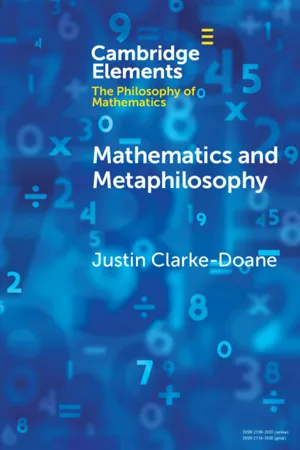
- 66 pages
- English
- PDF
- Available on iOS & Android
Mathematics and Metaphilosophy
About this book
This Element discusses the problem of mathematical knowledge, and its broader philosophical ramifications. It argues that the challenge to explain the (defeasible) justification of our mathematical beliefs ('the justificatory challenge'), arises insofar as disagreement over axioms bottoms out in disagreement over intuitions. And it argues that the challenge to explain their reliability ('the reliability challenge'), arises to the extent that we could have easily had different beliefs. The Element shows that mathematical facts are not, in general, empirically accessible, contra Quine, and that they cannot be dispensed with, contra Field. However, it argues that they might be so plentiful that our knowledge of them is unmysterious. The Element concludes with a complementary 'pluralism' about modality, logic and normative theory, highlighting its surprising implications. Metaphysically, pluralism engenders a kind of perspectivalism and indeterminacy. Methodologically, it vindicates Carnap's pragmatism, transposed to the key of realism.
Trusted by 375,005 students
Access to over 1 million titles for a fair monthly price.
Study more efficiently using our study tools.
Information
Table of contents
- Cover
- Title page
- Copyright page
- Mathematics and Metaphilosophy
- References
- Acknowledgments
Frequently asked questions
- Essential is ideal for learners and professionals who enjoy exploring a wide range of subjects. Access the Essential Library with 800,000+ trusted titles and best-sellers across business, personal growth, and the humanities. Includes unlimited reading time and Standard Read Aloud voice.
- Complete: Perfect for advanced learners and researchers needing full, unrestricted access. Unlock 1.4M+ books across hundreds of subjects, including academic and specialized titles. The Complete Plan also includes advanced features like Premium Read Aloud and Research Assistant.
Please note we cannot support devices running on iOS 13 and Android 7 or earlier. Learn more about using the app